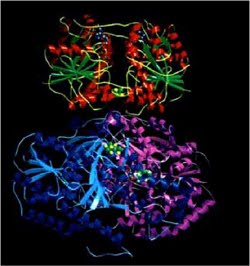A copy of a letter sent in early 2011 to Science magazine, the publication of the American Association for the Advancement of Science (it was not published):
An article headed Molecular Dynamic Simulations on page 1607 of volume 330 of Science dated 17 December 2010 said, 'a simple protein with 100 amino acids can fold 3^198 different ways... Proteins sort through all these possibilities in milliseconds or less.' And your editorial on page 1724 of volume 330 dated 24 December 2010 said, 'An animal cell behaves as though it contains a tiny computer, assessing the many signals it receives... But the crucial next challenge... is to decipher exactly how the elaborate networks of signalling molecules that exist inside a cell enable it to make its crucial decisions--a process analogous to cell "thinking".'
Without the quotation marks round 'thinking' those two excerpts together express a fundamental truth: intelligence drives life. Cellular intelligence is driven by molecular intelligence; organic intelligence is driven by cellular intelligence.
It is not just neurons that think and together make a vastly higher capability. All cells do. The entire body is brain, because every cell is intelligent (and because the purpose of the body is to serve the brain). I think, therefore I am what I am; I am what I am, therefore I think.
The cell does *not* behave as if it contains a tiny computer. No, it is a vastly powerful network of tiny computers--the myriad of molecules in it. It is a World-Wide Web of them, and the body is a Galactic Hyper-Web of World-Wide Webs.
But the driver of life is vastly more than just the driver of the life and development of the organism. Via genetic inheritance the intelligent processing continues through the generations, and thus the development of that life-form continues across the aeons.
It is not 'natural selection' and 'random mutations.' It is intelligent selection and intelligent changes.
Both disease and evolutionary dead-ends are therefore the same thing, on different time-scales: processing errors (albeit sometimes ones that did not produce enough flexibility to accommodate environmental changes).
skip to main |
skip to sidebar



Thoughts on the fundamental logic--i.e., the molecular logic--of life, plus other life items (the first are copied from my EStar blog, from 2006 onwards). The foundation of life is the logic of the atom; built on that is the logic of the molecule; built on that is the logic of the cell; built on that is the logic of the organ; built on that is the logic of the organism.


Popular Posts
-
This article from the online entity of Science , published by the American Association for the Advancement of Science, is yet more proof of ...
-
THE REAL ORIGIN OF SPECIES — BIODEVELOPMENT — by NOBILANGELO CERAMALUS (pronounced noble- arn -jillo kerra- mar -liss) Member of the Americ...
-
Using very fine electrodes, researchers have revealed some of the astonishing processing-power of a single human neuron. Full story at ht...
-
Bio-molecules are network processors. A cell is a collection of molecular network processors. The individual processing is affected by the b...
-
This article gets close to saying what this blog has been saying for years . Bio-molecular logic and processing operates over the aeons to ...
-
As this blog has been saying for years, the so-called 'junk' DNA is not junk. To use computer terms, DNA is CPU, RAM, disk drive, o...
-
The process of transcribing DNA instructions into proteins has now been found to be a lot smarter than previously imagined. A detailed com...
Total Pageviews
NOTE ON TOTAL PAGEVIEWS
Blogger's statistics have not been operating since the start of this blog. Only since mid 2009.
About Me

- Nobilangelo
- My Christian name is pronounced 'noble-arn-jillo' (i.e., both o's are long, so the first two syllables rhyme with 'noble' not 'hobble'--yes, I know that's obvious, because there's only one 'b' between the 'o' and the 'i', but some people seem to see two b's, hence the English lesson). My surname is pronounced kerra-marliss. I was born, bred and educated in New Zealand, except for an international systems-engineer's course in San Antonio, Texas. I am born-again Christian, a thinker with a very practical turn of mind, a scientist with a particular interest in planet-friendly energy and neuroscience, an engineer (mechanical, industrial and IT systems), an inventor, a Member of the American Association for the Advancement of Science, a writer and poet, a naturist, a designer in different fields, an arranger and composer of symphonic music, a multi-award-winning IT journalist, a photographer, and a practitioner at various times in other hands-on fields including building, metalwork, woodwork, stained-glass and landscaping.